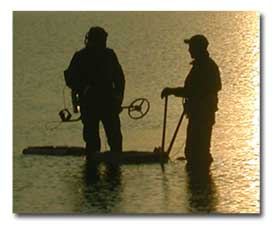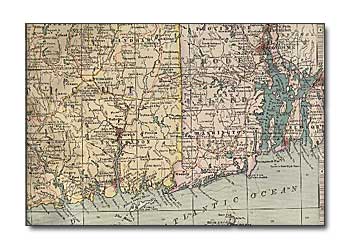Water Hunting Tips
Shallow water detecting
Water hunting is definitely a science, and probably one of the most difficult ways to metal detect, but it can be rewarding. However, it involves an ongoing process of learning. Every time we think we have it figured out, mother nature throws something new at us to prove us wrong. It has basically comes down to being in the right place at the right time.
These tips are for salt water hunting and on finding coins on beaches. First of all, you need to realize that the sand in the ocean is always on the move. The wind, currents, and tides are always changing the beach in unpredictable ways. The average person wouldn't notice this as much as an avid beach hunter would. So, if you're new to water hunting start by training your eye now.
Study the beach
 Since you are limited to the low tides, as far as hunting, you only have about four hours of searching to do. But before you jump into the water, take a look around, and notice parts of the beach that have less sand than the rest. Quite often it will be the same in the water.
Since you are limited to the low tides, as far as hunting, you only have about four hours of searching to do. But before you jump into the water, take a look around, and notice parts of the beach that have less sand than the rest. Quite often it will be the same in the water.
These areas are the best places to start. This is the technique we use and it works quite well, because usually it's only a part of the beach that is producing the finds. If you don't see an area, scan the beach with your detector fairly fast to find a spot that is producing and concentrate in that area.
Look for channels
Sometimes you'll see channels, also known as cuts, in the water, or you can look for areas with the heavier sand and pebbles. That will indicate that some of the sand has moved. Once you start finding old coins you'll know you're in the right spot, and you can bet there is more there because they generally lay in pockets. Also, if you're finding old coins, there is a good chance gold is nearby, but much deeper, so dig the whispers. Be patient and concentrate, scanning the area from different directions.
When to go
If you are just a beginner at water hunting, summertime would be the best time to try it out. Many people are swimming and replenishing the the beaches, so there should be plenty of targets to find. Start at the most popular beach in your area. Try to detect early in the morning, because the water is usually calmer, or later in the evening after everyone starts to go home. If you haven't found much, don't panic, the sand could move with the next tide.
Practice
If this is your first time out, it might be a good idea to practice. So before you jump in, practice in ankle deep water first, so you can see the general area of your target. A good water scoop is extremely important, and you need to know how to pinpoint your target, because when the water is murky you might as well have a blindfold on. We noticed that after water hunting for several years, we didn't need to use our pinpointing features on our land detectors anymore.
Watch the tides
Getting a Tide Chart for your area will come in real handy. Try to get to the beach two hours before low tide. Water hunting is all about timing and patience. You can go home empty handed for months, but when the right time comes, you could go home with a handful of gold rings.
Read our research notes on Ocean Tides.
Dig Everything
On most beaches there isn't any reason why you can't dig everything. In the water, the further you are away from the shore the less trash there is. Most pulltabs, aluminum pieces and bottle caps lay in the swash, where the water hits the beach. If you're just finding trash, you need to go in the water deeper. Gold is heavy and has the uncanny habit of always trying to make it's back to the center of the earth, so the gold is deep. It is laying in the hard clay under the loose sand.What if the place has been well hunted or overhunted? If you're in the water, and not getting any signals. Go for the tiny signals and dig what other detectors missed.
Respect Others
Ever go to a beach and look in the water, and it looks like a minefield? Please, always try to refill your holes even in the water. How do you do that? Simply turn your scoop over an use the tip to drag the sand back into the hole. Metal Detectorists have been banned from several lakes that we know of, because someone left four foot holes in the water.
No Night Hunting
Even though we know some people who do this, we would not recommend getting in the water and metal detecting at night. It's too scary for one thing. One morning we were in the ocean and it was real foggy and we heard something splashing in the water not three feet from us. It really scared us. It turned out to be a deer swimming by. But it wasn't worth the stress believe me.
Use the right equipment
If you haven't read our pages on water hunting equipment and accessories, we highly recommend that you do this, you need totally different equipment then for land hunting.
Researching New Spots
 There are many ways of finding new spots. You don't even have to go to the library.
There are many ways of finding new spots. You don't even have to go to the library.
Another way is to find some old beach pictures or postcards.
You can go to Ebay.com and type the name of your town or state, and I'll bet your eyes will pop out of what you going to see! This is by far our favorite way of research. But of course, if that is not enough, and you have the time, you could pay a visit to the library and dig up some old dusty books and maps.
Thanks for stopping by and reading our Water Hunting Tips.